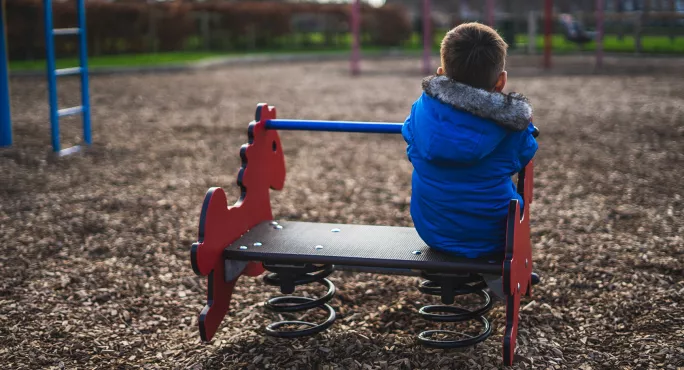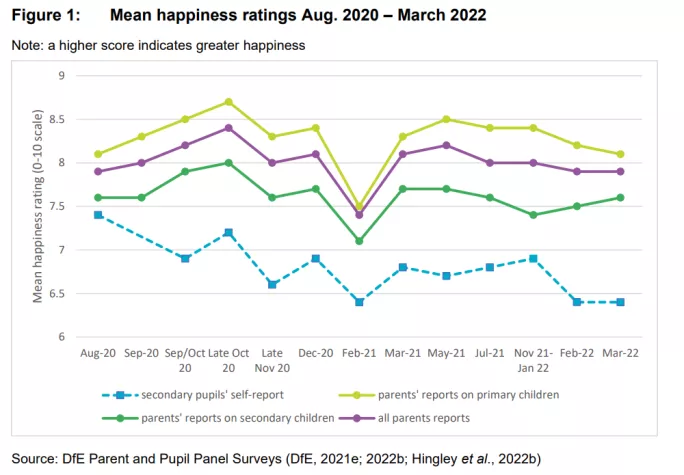Primary pupils worse hit by Covid school closures

Primary school pupils were more heavily impacted by partial school closures as a result of Covid lockdowns, a research paper released today suggests.
Evidence collected by parents showed a worsening of mental health among primary-aged pupils across the two periods of national lockdown during the pandemic, when schools were closed to most pupils, according to National Foundation for Educational Research analysis published today.
However, a mixture of parent and self-reported evidence on secondary school students’ mental health showed there was not such a marked worsening linked to school closures, the NFER said.
Evidence also suggests that the Covid restrictions in early 2021 may have had a more negative impact on school pupils than the first lockdown in March to June 2020, according to the report.
- School attendance: Pupils with mental health issues much more likely to miss lessons
- Children’s commissioner: Fix attendance, mental health and regional gap as priority, de Souza warns DfE
- Related: Covid paints a stark picture of pupil mental health
One study found that there was a 13 per cent increase in secondary students reporting that lockdowns had made their life worse in a survey in early 2021, compared with a survey in June 2020, according to the report.
How Covid affected pupils’ mental health
The number of those who said their life was better after the second lockdown also fell, by around 4 per cent, against those reporting in June 2020, the NFER analysis shows.

In September it was confirmed that the ongoing Covid-19 Inquiry will examine the impact on children of partial school closures during the spring and summer terms in 2019-20 and again in the 2020-21 spring term.
Other findings flagged up in the NFER report include:
- Secondary-aged girls consistently reported lower overall scores around happiness, life satisfaction and worthwhileness than their male counterparts throughout the pandemic.
- Primary-aged boys, however, showed signs of worse mental health from the end of 2019 to March 2021 than their female peers, according to parent reports.
- Disadvantaged children and young people were not more negatively impacted than their non-disadvantaged peers by the pandemic in terms of wellbeing, although the pre-pandemic evidence is clear that disadvantage is associated with lower overall wellbeing and poorer mental health, the NFER says.
- For some young people, particularly those with pre-existing poorer mental health, the restrictions at the start of the pandemic were associated with some improvement in their mental health.
- Young people reported greater feelings of “connectedness” with school during the first lockdown compared with before the pandemic. The authors of one study reported that students with low school connectedness pre-pandemic showed a greater increase in wellbeing scores and a greater reduction in anxiety in comparison to those with average-high school connectedness. This group also showed a small reduction in depression scores.
Paul Whiteman, general secretary of the NAHT school leaders’ union, said the “stripping away” of funding to support pupil mental health had led to schools being put under extra strain.
“Our members consistently raise pupil mental health and wellbeing as one of their top priorities. They are on the front line when it comes to identifying and supporting children and young people’s mental health needs, but the funding for accessible and timely professional support has been stripped away by lack of investment into education and health over the last decade,” he said.
“Teachers are not mental health specialists and cannot be expected to provide the specialist support that children and young people need.”
He added that it was crucial that the government ensured every school has “fully funded” mental health support available for pupils, including specialist help where appropriate.
A recent report from The Sutton Trust and University College London called for mental health provision to be included in Covid catch-up programmes.
Schools can access funding to train a senior member of staff to support pupil and staff mental health as a “mental health lead” through a DfE-funded training scheme, but the scheme has been criticised by heads as a “sticking plaster to mend a broken leg.”
The Department for Education has been contacted for comment.
Register with Tes and you can read two free articles every month plus you'll have access to our range of award-winning newsletters.
Keep reading with our special offer!
You’ve reached your limit of free articles this month.
- Unlimited access to all Tes magazine content
- Save your favourite articles and gift them to your colleagues
- Exclusive subscriber-only stories
- Over 200,000 archived articles
- Unlimited access to all Tes magazine content
- Save your favourite articles and gift them to your colleagues
- Exclusive subscriber-only stories
- Over 200,000 archived articles
topics in this article



